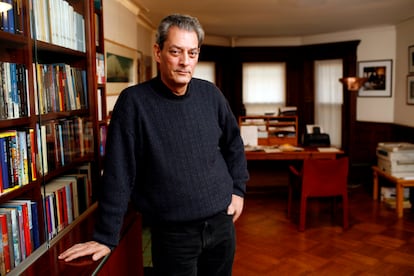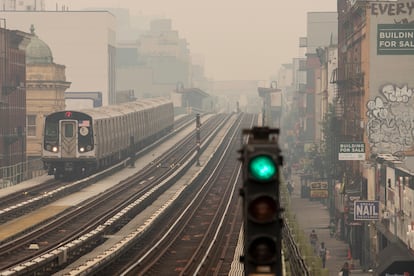Five essential novels by Paul Auster
New York City was a fundamental character in the work of the American writer, whose plots played with the idea of chance and spoke of love and friendship

He published his first book of poems half a century ago and his first essay, The Invention of Solitude, in 1982, but it was with his novels throughout that decade and the following ones that the Paul Auster phenomenon took off. His stay in France in his youth marked his literary vision, but few authors are so deeply associated with a city, with a place as diverse and legendary as New York, as Auster was. The author, who died on Tuesday at the age of 77, devoted his work to New York — and not just his novels but also essays like the one he wrote about the poet and writer Stephen Crane, or films like Smoke. Chance, loneliness, love, melancholy, fear, madness and friendship are essential elements in Auster’s stories, in which there are nods to great works of literature and meta-literary games, but without digressing or scaring away the reader.
The New York Trilogy. Three books published in the mid-1980s, City of Glass, Ghosts and The Locked Room, make up this volume with which Paul Auster rose to prominence. A story of detectives, mystery and literature, it demonstrated that a plot is not at odds with meta-literature, that an author can confabulate and speak to the reader by breaking down that fourth wall, by openly playing with reality, fiction, mysterious chance and madness, yet without giving up something as classic and entertaining as a good old detective story. In the first of the three installments Paul Auster himself and Miguel de Cervantes’ Don Quixote make an appearance.

Moon Palace. New York, the city where Auster lived most of his life; Columbia University, where he studied, and the family mysteries of the young Marco Stanley Fogg are all themes that run through this novel. It is a coming-of-age bildungsroman in which the orphaned protagonist is left destitute after losing his uncle Victor and has to try to survive in Manhattan. He discovers love with Kitty Wu and friendship with Zimmer, and gets hired by a mysterious old man who really wants for him to write his obituary. It is a tale of chance, family entanglements and the most human and everyday side of the big city.
The Book of Illusions. Considered by the renowned critic James Wood as the best of his works of fiction, Auster takes up the character of Zimmer from Moon Palace. Zimmer becomes the main character in this story in which loneliness, isolation, obsession and grief are the starting point. The loss of his family in an accident eventually leads Professor Zimmer to the story of a silent film actor whose whereabouts are unknown. Writing about him will help to unravel the mystery and heal the wounds that the protagonist will be able to close thanks to his contact with the actor. Throughout the story there are references to Chateaubriand’s Mémoires d’outre-tombe, which Zimmer intends to translate.
The Brooklyn Follies No one has represented quite like Paul Auster the aura of the writer in Brooklyn, the borough that he and his wife, author Siri Hustvedt, turned into a chic literary mecca from their home in Park Slope. In this novel, set in Brooklyn, Auster returns to some of the themes that mark his novels: the meeting of two loners, friendship as a lifeline, chance, and the fear of facing life.
4, 3, 2, 1. Four versions of the same life, that of Archie Ferguson, brought together in this great novel of more than 900 pages, published in 2017 and on which Auster worked for seven years. The order of factors does alter the product of a life, but what details can change the outcome of a biography? Auster throws the dice and changes the story of that Jewish boy from New Jersey, his parents, his university years, his loves... Everything is fortuitous, what we think, what we vote, what we want, this book seems to affirm. It was shortlisted for the 2017 Man Booker Prize and demonstrated the strength of his imagination.
Sign up for our weekly newsletter to get more English-language news coverage from EL PAÍS USA Edition
Tu suscripción se está usando en otro dispositivo
¿Quieres añadir otro usuario a tu suscripción?
Si continúas leyendo en este dispositivo, no se podrá leer en el otro.
FlechaTu suscripción se está usando en otro dispositivo y solo puedes acceder a EL PAÍS desde un dispositivo a la vez.
Si quieres compartir tu cuenta, cambia tu suscripción a la modalidad Premium, así podrás añadir otro usuario. Cada uno accederá con su propia cuenta de email, lo que os permitirá personalizar vuestra experiencia en EL PAÍS.
¿Tienes una suscripción de empresa? Accede aquí para contratar más cuentas.
En el caso de no saber quién está usando tu cuenta, te recomendamos cambiar tu contraseña aquí.
Si decides continuar compartiendo tu cuenta, este mensaje se mostrará en tu dispositivo y en el de la otra persona que está usando tu cuenta de forma indefinida, afectando a tu experiencia de lectura. Puedes consultar aquí los términos y condiciones de la suscripción digital.









































